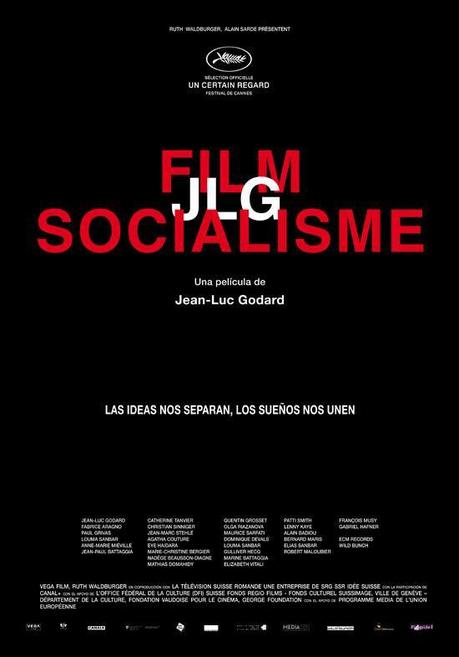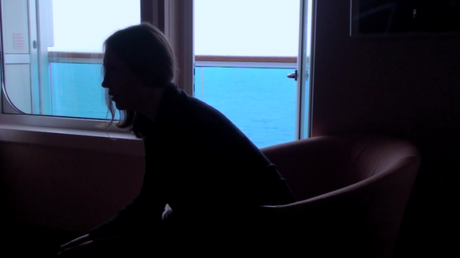
Film Socialisme (2010)
Director: Jean-Luc Godard
Runtime: 97 minutes
My Rating: 7/10
“This poor Europe. Not purified, but corrupted by suffering. Not glorified, but humiliated by recaptured liberty. Imagine a desert.”
With perhaps his most controversial and debated film to date, Jean-Luc Godard has encapsulated his strongly political, arguably pessimistic beliefs about the state of the modern world and he has done so his own way. He panders not to the filmgoing public; those expecting reason or rationality are in the wrong theater. His beliefs are purely his own, and with Film Socialisme he lays them bare, cryptic but fascinating, for us not to piece together but simply to puzzle over without any intention of resolving them fully.
To describe Film Socialisme is not to do its many layers of coded dialog proper justice. As a film it is quite an experience, and writing about it afterwards, while aiding to uncover hidden ideas that we may have skipped over in the film itself, pales in comparison to simply sitting and viewing it. Godard is expressing his ideas to us in an infuriating language that is intentionally puzzling, and much more interesting to listen to and soak in than if Godard had just told us what he is thinking in plain words. I viewed the film with the full English subtitles (as opposed to Godard’s infamous “Navajo” subs) and while perhaps it does give a little more to the viewer than the gimmicky one-word-out-of-ten ones, the dialog is still as hopelessly mindboggling as one could possibly expect. I found a transcript online of everything said and written in the film, and it is wonderful to study for those looking to uncover deeper truths in the film.

There is of course no plot. Godard simply utilises various people to preach his beliefs in numerous languages, to a degree so incredibly intense and frustrating it had me scratching my head several times. But I could not turn it off or look away, because the images were always so intriguing. Godard’s editing techniques are questionable, and the use of distorted colours, sounds and image qualities provide more depth and food-for-thought than simple digitised reality. Godard takes full advantage of his digital technology and twists and warps each and every image; some subtly, with simply the feel of the frame seeming unnerving, and others much more blatantly, with colours being altered and quality being diminished. Even when dialog isn’t being spoken – and it almost always is – there is something to contemplate in the image. Godard once spoke of “not a just image, just an image.” Godard’s images, while occasionally reflecting the politics in the dialog (consider the Odessa steps), are more often than not simple backdrops for the vast expanse of his philosophy to construct around. I see locales such as the cruise liner or the gas station to be places within Godard’s own mind, physical realizations of undescribable lands. The cruise ship, a vessel for Godard’s thoughts. The gas station, a rest stop for contemplation. And the various historical landmarks which close the film – Egypt, Palestine, Odessa, Hellas (Hell As), Naples and Barcelona – are frantic visitations, Godard ruminating on the effect we’ve had on the world around us, how our vital issues and problems are the responsibility of all of us, as a planet and as a humanity. It is inarguable that Godard sees us as having ruined our world, and that serious steps need to be taken to restore it (consider the closing title cards, WHEN THE LAW ISN’T JUST JUSTICE BECOMES THE LAW, and Godard’s final joke, the infamous NO COMMENT card, reminiscent of the FIN DE CINEMA which closed Week End (1967)).

Godard leaves us at the end of the film with more than enough to think about. This is a movie that needs to be discussed and puzzled over, otherwise its existence is next to meaningless. To call Godard pretentious for making it is a little stupid; this is simply one man conveying all his frenzied thoughts through the one medium that means the most to him: cinema. Not everyone is going to like Film Socialisme; I myself had problems with it, namely its infuriating inaccessibility, but I overcame them. Godard’s belligerance is purposeful; he wants to turn off immediately all viewers who aren’t going to have the time and patience to puzzle over his work. This entire film is all just one man’s opinions on society, and like them or not, they make for a fascinating, powerful study. Godard is still in my mind one of the most important filmmakers of all time, and his refusal to comply with the basic rules of cinema, while annoying to some, provides us all at least with some startling thoughts to ponder.
“I was thinking, about the cause of light, about the cause of darkness.”


